Innovation-driven global branding travels halfway round the world
(sinomach.com.cn)
In 2016, Sinomach subsidiary SUMEC Group Corporation (SUMEC) acquired Berkshire Blanket (BK), the largest merchandiser, designer and importer of consumer blankets in the United States. BK updates fabrics and technologies to improve user experience. It focuses on the green development trends in the home textile field and the demands of consumers at home and abroad, optimizes the home textile industrial and supply chains, and innovates in science and technology and its products.
At present, BK has sold 200 million pieces of home textile products in the world, and exported its anhydrous printing and dyeing series of self-developed products, generating sales revenue totaling $70 million.
In 2021, BK achieved sales revenue of more than $130 million around the world. The figure was over $45 million in the Chinese market, accounting for more than 30 percent of SUMEC's home textile business.
I. Background
Founded in 1993, BK is headquartered in Massachusetts, New England, the United States. After nearly 30 years of development, it has become a popular home furnishing brand in the country.
SUMEC's subordinate textile enterprises have long been dedicated to the global home textile industry and have a lot of experience in the industry and related supply chains. While expanding into the international market, SUMEC maintains friendly, long-term cooperation with BK. By 2016, the scale of their cooperation had exceeded $50 million. At that time, BK was one of the largest clients of SUMEC's home textile business. The company acquired BK and its brand to further localize operation, explore the needs of local customers and expand its share in the global market, a momentous step towards international operation.
In the early stages, the two companies tried to work as partners in upstream and downstream supply chains but later they moved towards unified operation, like sailors in the same boat. However, the information that the two parties had was asymmetrical due to cultural differences and inadequate platform construction, which hampered their deep integration. Products remained undiversified, technology uninnovated and the new demand for home furnishing unsatisfied. However, as the global home textile industry is influenced more by good brands and products than by high output, and people's aspiration for a better home life is growing, today there are new challenges bringing new opportunities.
Ⅱ. Solutions
1. Boosting cultural integration and the brand's cognitive drive
The brand cannot develop without the support of the China-US multinational teamwork. SUMEC places a high premium on the cultural integration of the team, and promotes mutual understanding and communication between the Chinese and American staff.
A detailed plan was tailored for cultural exchanges. The company organizes its Chinese employees to investigate local markets and visit key clients with their American counterparts four times each year. The American employees also come to China to investigate SUMEC's textile factories and learn more about its product development and manufacturing capacity. As a result, the two sides have reached a consensus on market demand and product positioning, and accommodated themselves to each other's work pace. Communication has been greatly enhanced.

Chinese employees participate in the team building activities of BK's American members. [Photo/SUMEC]
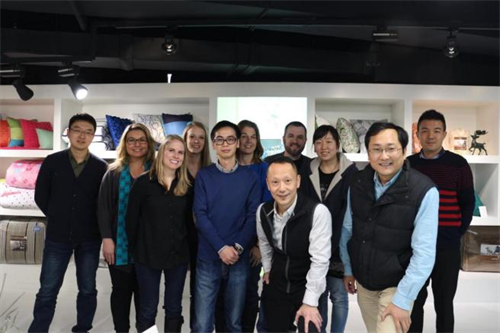
Chinese and American team members pose for a group photo during their visit to SUMEC's home textile factory. [Photo/SUMEC]
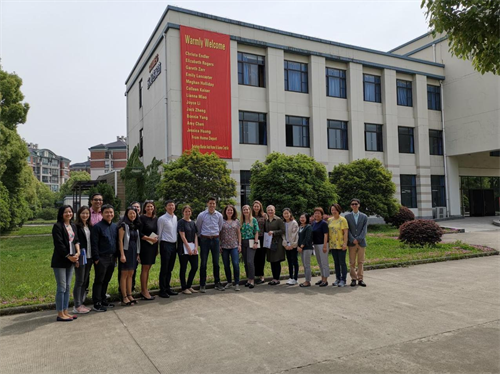
Chinese employees welcome American colleagues on their arrival at SUMEC Headquarters. [Photo/SUMEC]
Regular exchanges have brought the two teams closer. The Chinese team, which had been in the downstream supply chain, was invited to a bidder's meeting of a BK client, gaining access to first-hand information about the customer. And the two sides leveraged their strengths and won the bidding for the client's blanket project. That outcome has built up their mutual trust and contributed to a virtuous cycle of cooperation, laying a solid foundation for BK's future development.
2. Injecting vitality into the brand through technology innovation
The BK members have become accustomed to working together with their teammates from 12,000 kilometers away. At SUMEC's 40th anniversary celebrations, the American workers suggested making the products more environmentally and user friendly while ensuring their quality and beauty, an approach highly appreciated by their Chinese fellows.
The traditional textile sector is energy-intensive and highly polluting, which flies in the face of China's policy of energy conservation and environmental protection. As a result, BK quickly began developing new products with more efficient use of water resources and lower carbon emissions.
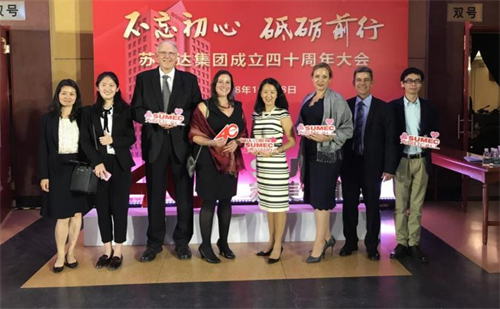
Representatives of the BK American team participate in SUMEC's 40th anniversary event. [Photo/SUMEC]
BK has drawn inspiration from coloured plastics and devised a less polluting coloring technique. It produced a wide range of colors through different coloring processes to improve both quality and variety. The finishing process is also being improved to make the fabrics as soft as possible.
The American marketing team registered the trademark "Eco Thread" for the new product line, and promoted BK's waterless dyeing products around the concept of green and environmental protection. The Chinese and American sides offered each other suggestions via online and offline communication to bring their cooperation to a higher level.
The waterless dyeing technique has made the productive process much more eco-friendly. The technique uses a master batch to realize direct dyeing during the spinning process instead of exhaust dyeing through high temperature and pressure. The dyes can penetrate the yarn, which makes the products colour-fast and meets consumers' demands for higher quality. It avoids polluting the environment by discharging no dyes and consumes less raw materials, enabling fibers that are not suitable for high temperature and pressure dyeing to be interwoven with polyester.
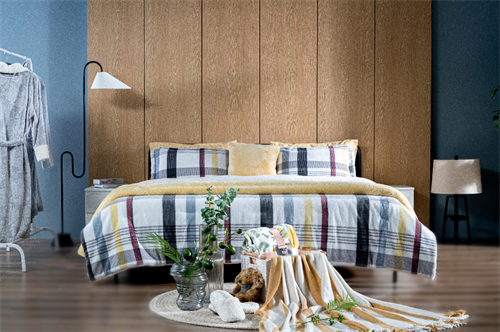
BK waterless dyeing home textile products [Photo/SUMEC]
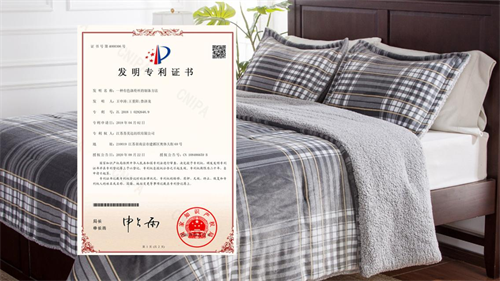
A patent for invention of BK self-developed waterless dyeing process [Photo/SUMEC]
3. Building a new ecosystem brand through product innovation
BK stays committed to innovation. Increasingly strengthened communication between the two sides has greatly contributed to the company's business development. It has created a new digital system to show more open and transparent information on orders, R&D and samples, and to make delivery dates more transparent.
In 2019, another BK major client, who is also a big retailer in the US, released a traditional flannel blanket project with an estimated value of over $10 million. Given that producing flannel blankets is not complicated, it requires ingenuity to stand out in the fierce competition. The China-US team decided to innovate its design and process instead of undercutting its rivals. A fully matte flannel blanket was developed with a new yarn and through new processes.
Smooth in touch, bright in color and dense in pile, the blanket right away caught the eye of the client who immediately decided to begin cooperation with BK. In the past two years, BK has continued to roll out new products through collaborative innovation and exceeded the expectations of major customers, which has given fuller play to both sides.
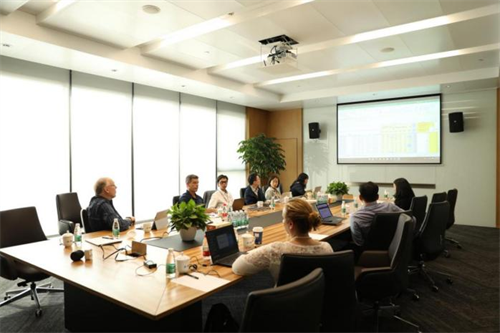
Chinese and American representatives explore better plans to promote business activities at an offline seminar. [Photo/SUMEC]
BK heightens its efforts to promote product innovation and diversify products to help the brand's sustainable development. Based on its advantages in marketing, sales and resources, BK makes full use of its rich experience in bedding, lounge-wear, and pet and other competitive products.
The incubation of new categories of products has been launched on the BK platform, and paired-up teams have been built according to different types of products' demand for resources and production. Different team members are in charge of design, marketing, sales, product development, and supply chain integration of a specific product.
The functions of the BK sharing center has been upgraded to empower the paired-up teams, diversify the products and build up BK's overseas resource platform.
4. Optimizing market structure and building brand reputation
So that BK can better enter the domestic Chinese market and fit with the habits of local Chinese users, the company has cooperated with the Palace Museum to launch a series of high-end home furnishing products featuring Chinese palace culture. It has also cooperated with e-commerce platforms including Tmall and Sam's Club to open online flagship and member stores. It now pays closer attention to live streaming to make more people aware of its quality branded products.
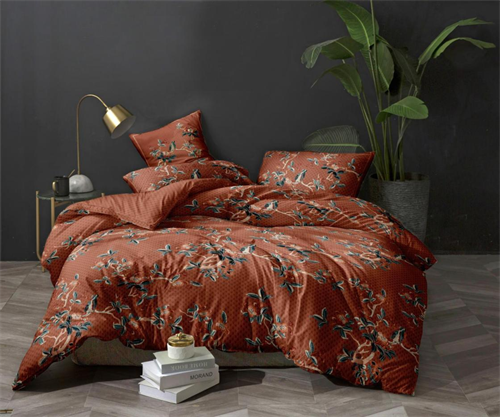
Bedding co-branded with BK and the Palace Museum [Photo/SUMEC]
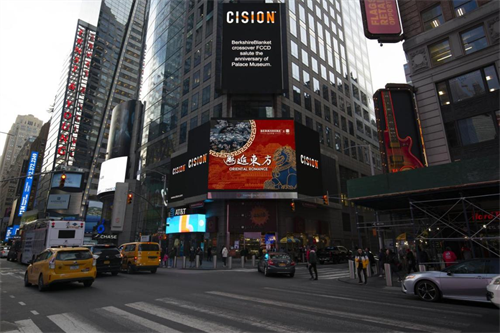
The product series "Oriental Romance" in partnership with the Palace Museum is promoted on the Mega Screen at Times Square in New York. [Photo/SUMEC]
III. Branding effect
1. Economic benefits
In recent years, BK has built a comprehensive system of resources and capabilities in the North American market. It works to provide customers with quality products and services and strengthen its brand building. An overall household product system featuring blankets, woven bedding, lounge-wear and pet products has been established. All of these achievements have contributed to SUMEC's growing influence in the home textile industry.
In 2020, BK's waterless dyeing technology was approved as a national patent, and more than 3,000 tons of waterless dyed fabrics were put into production, further enriching SUMEC's home textile product system, the outstanding performance of which has given the company a greater say in the supply chain of major supermarkets such as Costco, Walmart and Target. The sales volume of waterless dyed products rose to $20 million in 2020 and topped $50 million in 2021.
After more than one year of effort, BK has developed new categories such as woven bedding, electric blankets and lounge-wear. Total sales and orders in the new categories in 2021 approximated $24 million, surpassing the target by 25.8 percent. By the end of 2023, sales in the new categories are expected to reach $67.5 million, and account for 35 percent of BK's total sales.
In 2021, BK, based on its edges in velvet products, responded to the habits of Chinese consumers and the international aesthetics and followed the principle of helping people live a more comfortable life through softer and warmer home textiles, generating more than 45 million yuan in online and offline sales.
2. Social benefits
Upholding the philosophy of innovation-driven development and pooling its industrial resources, BK has taken a solid step towards technological innovation and the building of green supply chains. Its waterless dyeing technique goes a long way towards sustainable development of society and the environment.
Less water input. The waterless dyeing technique consumes 15 tons of water in the finishing process to produce one ton of finished fabrics, using only half the water compared with the traditional method. Besides, the water used in the finishing process is recyclable.
Less environmental pollution. The technique does not discharge wastewater laden with chemical dyes, and thus avoids polluting the environment while reducing the cost of wastewater treatment.
Higher product quality. The new technique realizes synchronous dyeing and spinning to greatly enhance colour fastness. The brighter, softer and more durable textiles have won extensive recognition from consumers.

 R&D and Manufacture
R&D and Manufacture Project Contracting
Project Contracting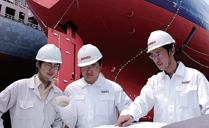 Trade and Services
Trade and Services




